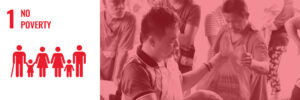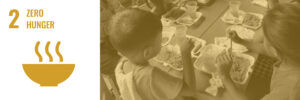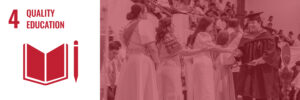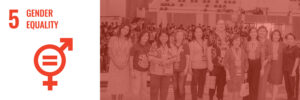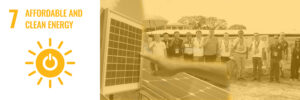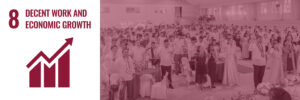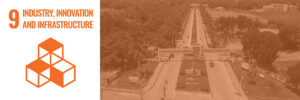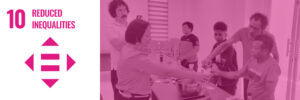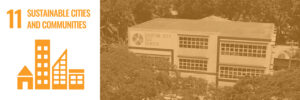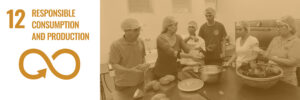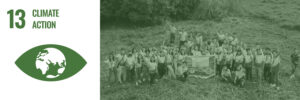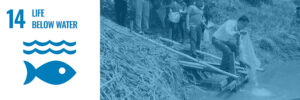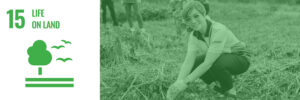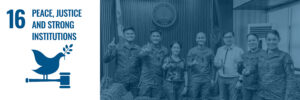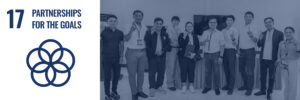2023 – Research | SDG 2 – Zero Hunger
Technical Research Category
Evaluation of Mycelial Growth of Wood Ear Mushroom (Auricularia auricula-judea) on Different Culture Media
Proponent: Joel P. Bautista
Abstract
This study evaluated the mycelial growth of Auricularia auricula-judea (wood ear mushroom) on different culture media: Potato Dextrose Agar (PDA), Cassava Dextrose Agar (CDA), Rice-Wash Dextrose Agar (RWDA), Sweet Potato Dextrose Agar (SPDA), and Corn Starch Dextrose Agar (CSDA). The experiment was laid out in a Completely Randomized Design (CRD) with three replications. Mycelial growth was monitored by measuring the average diameter of mycelial colonies daily over two weeks. Statistical analysis using ANOVA revealed significant differences in mycelial growth among treatments. Results indicated that CDA and RWDA were comparable to PDA, the standard medium, in supporting mycelial growth. These findings suggest the potential for alternative, cost-effective substrates in mushroom cultivation. this study contributes to identifying sustainable media options for commercial mushroom production.
Extension
PAGBIYAGAN TI ARUBUBAYAN: PATO-MANOK AT GULAY, MAKA-KABUTENG PANGKABUHAYAN
Proponents: Isaiac C. Dela Peña, Josephine C. Cristobal, Cipriano M. Ticman, Jr.
The “Pato-Manok at Gulay, Maka-Kabuteng Pangkabuhayan (PMGMP)” Program is an integrated agricultural extension and livelihood initiative led by the Institute of Agricultural Technology at Isabela State University-Cauayan Campus. This program is conducted in collaboration with the Province of Isabela Green Ladies Association Inc. (PIGLAI) and the Cauayan City Green Ladies Organization (CCGLO). The PMGMP aims to enhance knowledge, skills, and attitudes (KSA) for the empowerment of farmers and household parents, with a special focus on women’s organizations like the Barangay Green Ladies Organization (BGLO), in addressing poverty and food security. Through seminars, training, and workshops, the program established three main components: poultry, vegetable, and mushroom production. These components serve as training grounds for exploring livelihood practices in the community of Barangay Nagrumbuan, Cauayan City, Isabela, focusing on the production and marketing of ducks, poultry, vegetables, and mushrooms. The PMGMP Program has significantly impacted the local community by providing job opportunities to farmers and members of women’s organizations like the BGLO. Many members have now engaged in mushroom culture and production as a livelihood, funded by PIGLAI. Additionally, some members have started small businesses developing mushroom-based delicacies and products such as mushroom chicharron, sisig, and hot mushroom adobo. Other farmers have ventured into duck and poultry businesses, including broiler production, selling their products locally, and becoming a source of food and income for their families. Barangay Nagrumbuan has been recognized as one of the outstanding barangays in north Cauayan City and has been awarded the “Best Communal Garden” for its integrated vegetable production. Economically, the community has achieved additional income for their families and made technical advancements in their agribusiness ventures.
PROGRAM/PROJECT TITLE: RESILIENCE-BUILDING AMONG SMALLHOLDER FARMERS OF SELECTED UPLAND FARMING COMMUNITIES IN THE PROVINCE OF ISABELA, PHILIPPINES
The smallholder upland farmers in Isabela, Philippines are one of the most vulnerable sectors to external shocks such as pandemic, climate change and natural calamities, particularly typhoons. As external shocks are inevitable, there is a need to build the resilience of agricultural sector especially in developing nations such as the Philippines particularly the vulnerable farmers in the uplands farming communities in the country through redesigning of their agricultural production systems that are based on the sustainable use of natural resources such as agroforestry system. This proposed capacity development project aims to increase the resilience of vulnerable smallholder farmers in the uplands from critical and pervasive threats of COVID-19 pandemic and natural disasters. There are policy assessments done and proposed specific suggestions for institutionalization of agroforestry in the area. The conduct of multiple trainings such as workshops and training of trainers enhanced and encouraged the farmers to be more engaged with the proposal of the demonstration farms which are now present in certain areas of the upland barangays.
SDG Addressed: SDG 1 – No Poverty; SDG 2 – Zero Hunger; SDG 11- Sustainable Cities and Communities; SDG 13 – Climate Action; SDG 17 – Partnerships for the Goals
6P’s Per Objectives:
This proposed capacity development project aims to increase the resilience of vulnerable smallholder farmers in the uplands from critical and pervasive threats of COVID-19 pandemic and natural disasters. The project specifically aimed to:
- build the knowledge and skills of upland smallholder farmers, farmer organizations, and local government units in the design and establishment of appropriate agroforestry systems in their local communities (People Services, Places and Partnerships) ;
- utilize and strengthen the resources and capacity of local multi-stakeholders respectively, for collaborative resilience-building projects (People Services, Places and Partnerships) ; and
- formulate policy recommendations for institutionalization of adaptive and resilience-building programs (Policies, Publication)
WINGS OF CHANGE: BOOSTING PRODUCTIVITY THROUGH POULTRY PRODUCTION
Proponent: Lilibeth S. Languido
The Isabela State University San Mariano Campus has been well known in terms of Agricultural production from crops to livestock production since 1978. Poultry production is one of the focusses of the institution since the commodity is considered as one of the quickest productions that gives return/ income and requires less capital and labor. In 2021, the campus is one of the lucky recipients of the Poultry Multiplier Farm worth Five Million (5,000,000.00) under the Bayanihan II program of the Department of Agriculture Regional Field Office 02, which aims to alleviate the effect of the Covid-19 pandemic on the affected constituents (Displaced workers) of the community. The University was given the task to produce quality breeders (Rooster and Hen) and chicks, that were dispersed to qualified recipients for upgrading purposes. A repayment scheme was also implemented in which farmers were obliged to repay 20 chicks one year after the receipt of the animals to ensure the continuity of the project. At present a total of eight hundred ninety-six (896) heads have been dispersed in the municipality of San Mariano, with twenty-nine (29) recipients. Eighteen (18) men, and eleven (11) women were empowered through the series of trainings conducted, an increase in population of the Native chicken by the recipient of Brgy. Dibuluan, San Mariano, Isabela at about 180% based on the data was noted and an additional income amounting to 6,968 pesos was reported by various beneficiaries. The project is also aligned with the Sustainable Development Goals addressing SDG nos. 1,2,3, 4,5,8,10,12,15 and 17, in which impacts on the beneficiaries may be measured.

